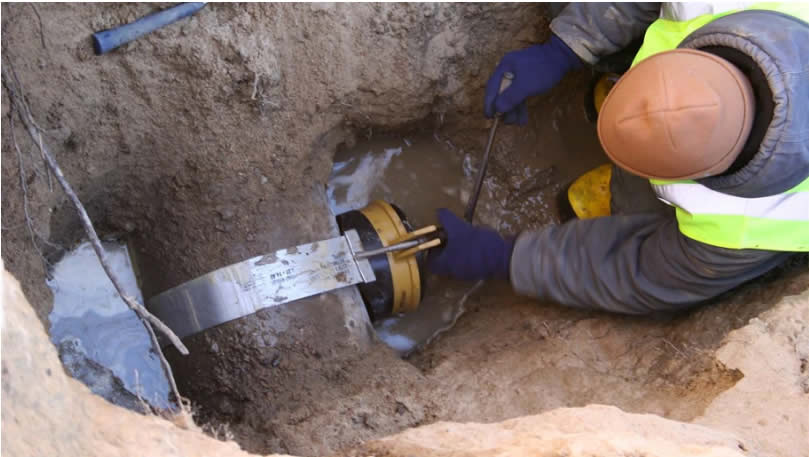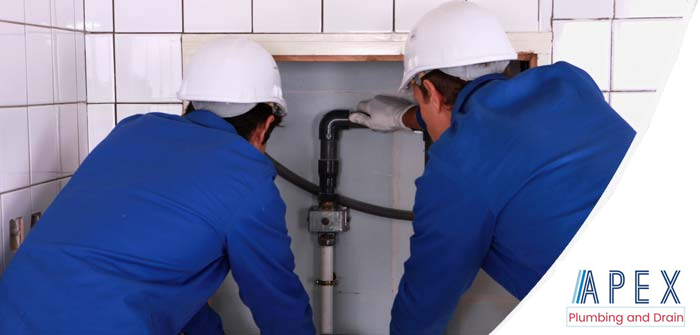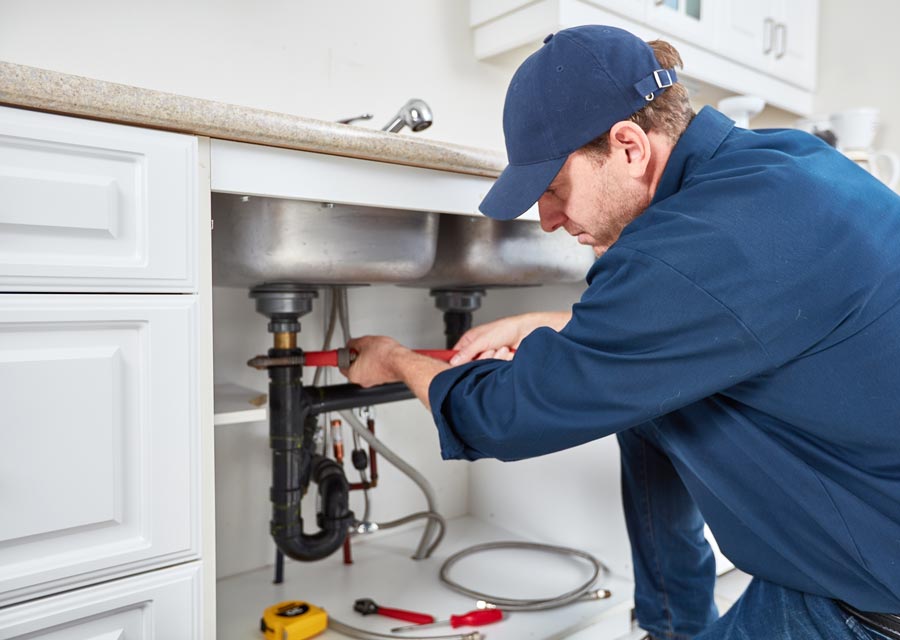Tired of dealing with leaks, unpleasant odors, and other plumbing annoyances? While it’s usually impossible to prevent every plumbing issue through maintenance, taking care of your plumbing system can cut down on your risk of dealing with annoyances and costly repairs.

From preventing frozen pipes to avoiding chemical-based damage to your pipes, we’ve listed 15 ways to keep your home’s plumbing in an optimal condition below. All of these tips are quick, easy and require no plumbing expertise, making them ideal for yearly preventative maintenance.
Avoid using store-bought drain cleaning chemicals
Got a blocked drain? While store-bought chemicals might seem like the best option, the reality is that they’re far from good for your drains. Over time, the chemicals used in drain cleaners erode your pipes, increasing the risk of your home’s plumbing system experiencing a leak.
If you’ve got a blocked sink, shower or drainpipe, a better solution is to contact a plumber. Most of the time, they’ll be able to remove the blockage and solve the problem without needing to use corrosive chemicals.
Clean minor blockages using enzyme-based cleaners
Feel like clearing out a blocked pipe by yourself? If you’d prefer not to call in the experts and want to remove a blockage by yourself at home, switch out the conventional chemicals for a natural, enzyme-based pipe cleaning solution.
Enzyme-based cleaners use natural bacteria to soften and free clogs in your pipes. While they aren’t quite as effective as harsh chemicals, they’re more than suitable for minor blockages and produce much less wear and tear on your pipes.
Run a small amount of water to avoid frozen pipes
Worried about frozen pipes this winter? One of the easiest ways to avoid frozen pipes is to keep a small amount of water running from your kitchen or bathroom faucet throughout the night and day, which keeps a stream of water running through your home’s pipes at every moment.
Prefer a less wasteful solution? If you live in an area with cold winter weather, consider investing in plumbing insulation to keep your pipes warm and protected from the cold.
Pay attention to common signs of a leak
From damp spots on your flooring to rings on the ceiling of your home, a variety of signs tend to appear as leaks develop. Staying on top of these signs and acting quickly helps you fix leaks as they appear, reducing the risk of long-term damage to your home.
Leaks can quickly develop from minor inconveniences into major problems, making it important that you act quickly. If you notice any of the signs of a leak, contact an expert plumber and have the leak repaired as soon as possible.
Older home? Consider replacing your pipes
Pipes are one of the most common points of failure in older homes, particularly homes built 30 to 40 years ago. Generally, older pipes are more likely to incur damage than new pipes. They also tend to be less efficient and capable of withstanding changes in temperature.
If you live in an older home without a recently updated plumbing system, replacing your pipes could be a good decision that helps you avoid common plumbing issues.
Use a water softener to avoid hard water
Many parts of the US have a problem with “hard water.” That is water that’s overly rich in minerals such as calcium and magnesium. This can make your water less pleasant to bathe in while increasing the level of strain on your plumbing system.
If your area has an issue with hard water, consider buying a water softener. These devices reduce the level of calcium and magnesium in your home’s water supply, resulting in more pleasant water for you as an end user and a reduced level of strain on your pipes.
Memorize the location of your home’s shutoff valves
Do you know where your home’s shutoff valves are? From leaks to overflows, shutoff valves let you quickly shut off the supply of water to your home and minimize the amount of damage from common plumbing issues.
If you haven’t already done so, take a minute or two to memorize where the shutoff valves for your home are located. In the event of a plumbing problem, the knowledge could save you a huge amount of money in the form of prevented damage.
Notice a bad smell? Solve it as early as possible
A bad smell emanating from your toilet, shower or kitchen sink can often indicate a damaged or completely broken pipe that’s not draining properly. In some cases, it can even be an early sign of a serious leak that could cause damage to your home.
Instead of opening a window to reduce the intensity of the smell, act quickly by calling an expert plumber to diagnose the problem and complete a repair. This way, you’ll reduce the risk of leaks and other odor-resulting damage leading to serious property damage.
Avoid flushing all women’s sanitary or hygiene products
Want to reduce your risk of dealing with a blocked toilet? Keep a simple rule: other than human waste, the only thing you’re allowed to flush down the toilet is toilet tissue. No sanitary pads or tampons and no contraceptives – nothing but waste and tissues.
Following this rule is a great way to avoid the most common causes of toilet blockages, helping you reduce the total amount you spend maintaining your home’s plumbing system over the long term.
Check cupboards, storage areas, and other locations regularly for leaks
Leaks can develop without you noticing, often inside cupboards and other storage areas that are hidden from view.
If you’re concerned about potential leaks, it’s a good idea to open your cupboards and storage areas every one to two weeks to check for moisture. A small buildup or water or extra humidity can often signal a leaking faucet or damaged pipe.
Frequent leaks? Try lowering your water pressure
Believe it or not, leaky faucets and damaged pipes can often be the result of excessive levels of water pressure. Over time, the extra pressure can wear downpipes, faucets, shower heads and other items, causing them to develop leaks.
If you frequently get leaks at home, reducing your water pressure could be the optimal solution, particularly if you live in an older home with plumbing that’s been subjected to several decades of wear and tear.
Memorize the location of your sewer valve
Dealing with a clogged sewer line? Instead of wasting valuable time asking a plumber to search for it (potentially at your own expense), it’s worth memorizing the location of your sewer valve so that you can quickly point the plumber in the right direction.
Doing so won’t only save you time, it could also result in a cheaper plumbing bill due to lower labor time.
Reduce your water usage
Another easy way to reduce your likelihood of dealing with plumbing problems is to reduce your level of water usage. Less water consumption means less wear and tear on your pipes, faucets and other plumbing equipment, saving you money in the long term.
This means switching from long showers to shorter ones or using the dishwasher every second day instead of every day. Small decisions like these can have a surprisingly large effect on your water consumption, helping you save money and reduce long-term plumbing wear.
Keep track of your water heater
Water heaters, in particular, conventional tank heaters do require a significant amount of ongoing maintenance to remain in good condition. Over time, sediment can build up inside a tank heater, increasing the amount of wear on the tank and making maintenance essential.
From noises to an increase in sediment in your water, there are numerous signs that your tank heater needs maintenance. Keep track of these signs and you’ll be able to tackle problems as soon as they appear, helping you avoid more costly repair bills.
Not sure what to do? Call in the experts
Finally, one of the best ways to keep your home’s plumbing system in optimal condition all year is to leave most problems to the experts.
From blocked drains to leaks, it’s usually best to call in a plumber instead of trying to solve your plumbing problems on your own. This way, you’ll get expert quality repairs without the same risk of damaging your home’s plumbing system through a DIY repair.
Would you like to speak to an expert plumber? Contact us now to talk to a member of our team and learn more about our plumbing services. We’re available 24/7 to provide instant service for plumbing emergencies and urgent situations.
The post 15 Ways to Keep Your Home’s Plumbing in Optimal Condition Year Round appeared first on Apex Plumbing and Drain.



